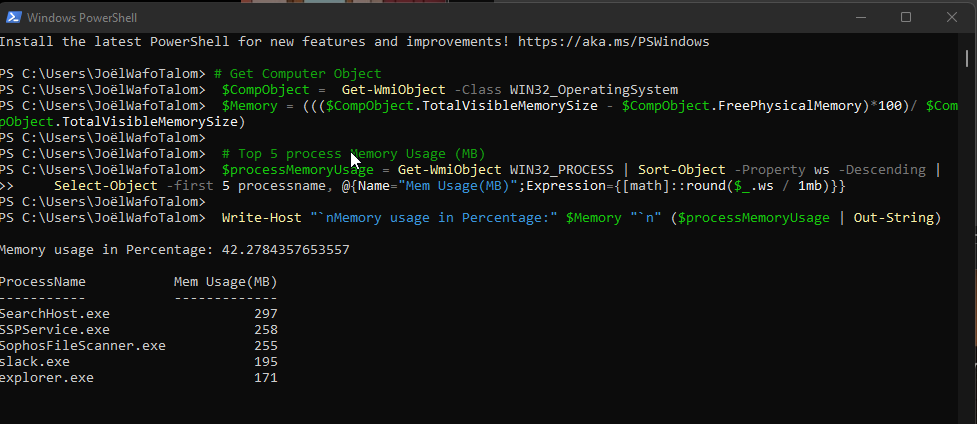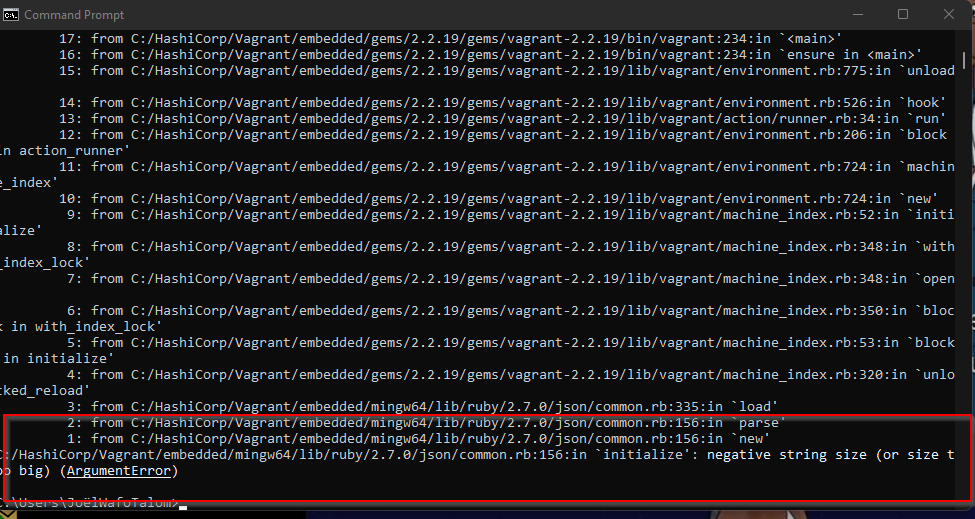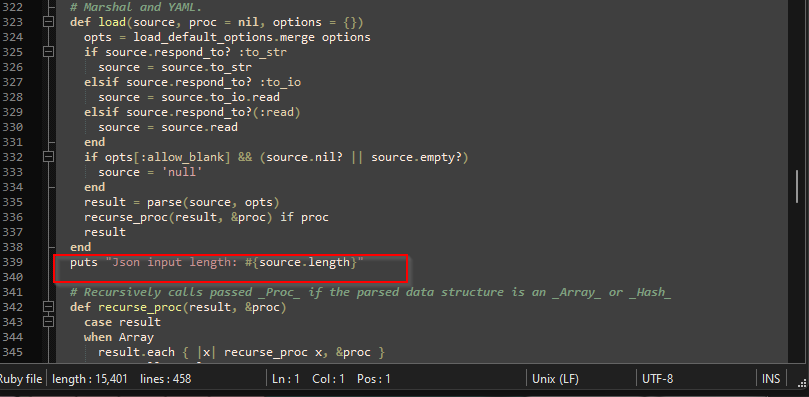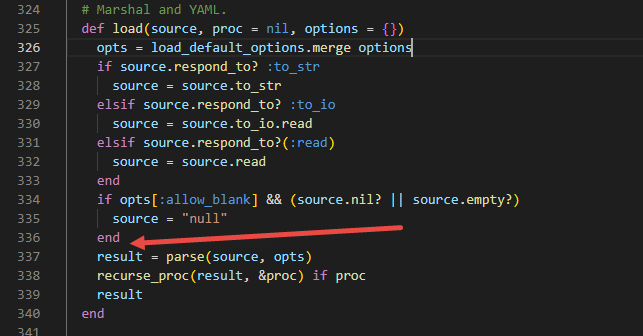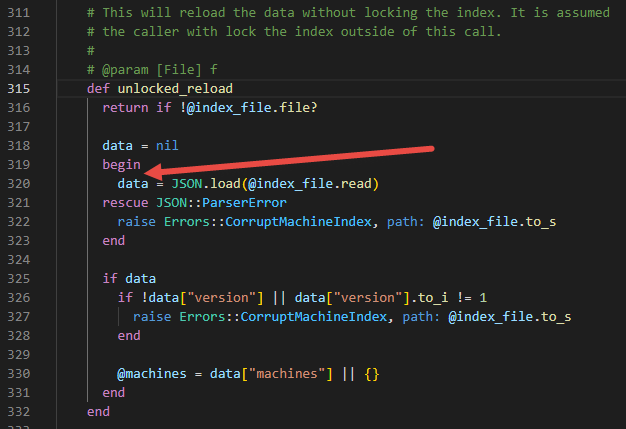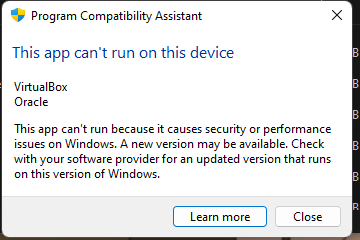here is the actual file content C:\HashiCorp\Vagrant\embedded\mingw64\lib\ruby\2.7.0\json\common
#frozen_string_literal: false
require ‘json/version’
require ‘json/generic_object’
module JSON
class << self
# If object is string-like, parse the string and return the parsed
# result as a Ruby data structure. Otherwise generate a JSON text from the
# Ruby data structure object and return it.
#
# The opts argument is passed through to generate/parse respectively.
# See generate and parse for their documentation.
def [](object, opts = {})
if object.respond_to? :to_str
JSON.parse(object.to_str, opts)
else
JSON.generate(object, opts)
end
end
# Returns the JSON parser class that is used by JSON. This is either
# JSON::Ext::Parser or JSON::Pure::Parser.
attr_reader :parser
# Set the JSON parser class _parser_ to be used by JSON.
def parser=(parser) # :nodoc:
@parser = parser
remove_const :Parser if const_defined?(:Parser, false)
const_set :Parser, parser
end
# Return the constant located at _path_. The format of _path_ has to be
# either ::A::B::C or A::B::C. In any case, A has to be located at the top
# level (absolute namespace path?). If there doesn't exist a constant at
# the given path, an ArgumentError is raised.
def deep_const_get(path) # :nodoc:
path.to_s.split(/::/).inject(Object) do |p, c|
case
when c.empty? then p
when p.const_defined?(c, true) then p.const_get(c)
else
begin
p.const_missing(c)
rescue NameError => e
raise ArgumentError, "can't get const #{path}: #{e}"
end
end
end
end
# Set the module _generator_ to be used by JSON.
def generator=(generator) # :nodoc:
old, $VERBOSE = $VERBOSE, nil
@generator = generator
generator_methods = generator::GeneratorMethods
for const in generator_methods.constants
klass = deep_const_get(const)
modul = generator_methods.const_get(const)
klass.class_eval do
instance_methods(false).each do |m|
m.to_s == 'to_json' and remove_method m
end
include modul
end
end
self.state = generator::State
const_set :State, self.state
const_set :SAFE_STATE_PROTOTYPE, State.new
const_set :FAST_STATE_PROTOTYPE, State.new(
:indent => '',
:space => '',
:object_nl => "",
:array_nl => "",
:max_nesting => false
)
const_set :PRETTY_STATE_PROTOTYPE, State.new(
:indent => ' ',
:space => ' ',
:object_nl => "\n",
:array_nl => "\n"
)
ensure
$VERBOSE = old
end
# Returns the JSON generator module that is used by JSON. This is
# either JSON::Ext::Generator or JSON::Pure::Generator.
attr_reader :generator
# Returns the JSON generator state class that is used by JSON. This is
# either JSON::Ext::Generator::State or JSON::Pure::Generator::State.
attr_accessor :state
# This is create identifier, which is used to decide if the _json_create_
# hook of a class should be called. It defaults to 'json_class'.
attr_accessor :create_id
end
self.create_id = ‘json_class’
NaN = 0.0/0
Infinity = 1.0/0
MinusInfinity = -Infinity
The base exception for JSON errors.
class JSONError < StandardError
def self.wrap(exception)
obj = new(“Wrapped(#{exception.class}): #{exception.message.inspect}”)
obj.set_backtrace exception.backtrace
obj
end
end
This exception is raised if a parser error occurs.
class ParserError < JSONError; end
This exception is raised if the nesting of parsed data structures is too
deep.
class NestingError < ParserError; end
:stopdoc:
class CircularDatastructure < NestingError; end
:startdoc:
This exception is raised if a generator or unparser error occurs.
class GeneratorError < JSONError; end
For backwards compatibility
UnparserError = GeneratorError
This exception is raised if the required unicode support is missing on the
system. Usually this means that the iconv library is not installed.
class MissingUnicodeSupport < JSONError; end
module_function
Parse the JSON document source into a Ruby data structure and return it.
opts can have the following
keys:
* max_nesting: The maximum depth of nesting allowed in the parsed data
structures. Disable depth checking with :max_nesting => false. It
defaults to 100.
* allow_nan: If set to true, allow NaN, Infinity and -Infinity in
defiance of RFC 7159 to be parsed by the Parser. This option defaults
to false.
* symbolize_names: If set to true, returns symbols for the names
(keys) in a JSON object. Otherwise strings are returned. Strings are
the default.
* create_additions: If set to false, the Parser doesn’t create
additions even if a matching class and create_id was found. This option
defaults to false.
* object_class: Defaults to Hash
* array_class: Defaults to Array
def parse(source, opts = {})
Parser.new(source, **(opts||{})).parse
end
Parse the JSON document source into a Ruby data structure and return it.
The bang version of the parse method defaults to the more dangerous values
for the opts hash, so be sure only to parse trusted source documents.
opts can have the following keys:
* max_nesting: The maximum depth of nesting allowed in the parsed data
structures. Enable depth checking with :max_nesting => anInteger. The
parse! methods defaults to not doing max depth checking: This can be
dangerous if someone wants to fill up your stack.
* allow_nan: If set to true, allow NaN, Infinity, and -Infinity in
defiance of RFC 7159 to be parsed by the Parser. This option defaults
to true.
* create_additions: If set to false, the Parser doesn’t create
additions even if a matching class and create_id was found. This option
defaults to false.
def parse!(source, opts = {})
opts = {
:max_nesting => false,
:allow_nan => true
}.merge(opts)
Parser.new(source, **(opts||{})).parse
end
Generate a JSON document from the Ruby data structure obj and return
it. state is * a JSON::State object,
* or a Hash like object (responding to to_hash),
* an object convertible into a hash by a to_h method,
that is used as or to configure a State object.
It defaults to a state object, that creates the shortest possible JSON text
in one line, checks for circular data structures and doesn’t allow NaN,
Infinity, and -Infinity.
A state hash can have the following keys:
* indent: a string used to indent levels (default: ‘’),
* space: a string that is put after, a : or , delimiter (default: ‘’),
* space_before: a string that is put before a : pair delimiter (default: ‘’),
* object_nl: a string that is put at the end of a JSON object (default: ‘’),
* array_nl: a string that is put at the end of a JSON array (default: ‘’),
* allow_nan: true if NaN, Infinity, and -Infinity should be
generated, otherwise an exception is thrown if these values are
encountered. This options defaults to false.
* max_nesting: The maximum depth of nesting allowed in the data
structures from which JSON is to be generated. Disable depth checking
with :max_nesting => false, it defaults to 100.
See also the fast_generate for the fastest creation method with the least
amount of sanity checks, and the pretty_generate method for some
defaults for pretty output.
def generate(obj, opts = nil)
if State === opts
state, opts = opts, nil
else
state = SAFE_STATE_PROTOTYPE.dup
end
if opts
if opts.respond_to? :to_hash
opts = opts.to_hash
elsif opts.respond_to? :to_h
opts = opts.to_h
else
raise TypeError, “can’t convert #{opts.class} into Hash”
end
state = state.configure(opts)
end
state.generate(obj)
end
:stopdoc:
I want to deprecate these later, so I’ll first be silent about them, and
later delete them.
alias unparse generate
module_function :unparse
:startdoc:
Generate a JSON document from the Ruby data structure obj and return it.
This method disables the checks for circles in Ruby objects.
WARNING: Be careful not to pass any Ruby data structures with circles as
obj argument because this will cause JSON to go into an infinite loop.
def fast_generate(obj, opts = nil)
if State === opts
state, opts = opts, nil
else
state = FAST_STATE_PROTOTYPE.dup
end
if opts
if opts.respond_to? :to_hash
opts = opts.to_hash
elsif opts.respond_to? :to_h
opts = opts.to_h
else
raise TypeError, “can’t convert #{opts.class} into Hash”
end
state.configure(opts)
end
state.generate(obj)
end
:stopdoc:
I want to deprecate these later, so I’ll first be silent about them, and later delete them.
alias fast_unparse fast_generate
module_function :fast_unparse
:startdoc:
Generate a JSON document from the Ruby data structure obj and return it.
The returned document is a prettier form of the document returned by
#unparse.
The opts argument can be used to configure the generator. See the
generate method for a more detailed explanation.
def pretty_generate(obj, opts = nil)
if State === opts
state, opts = opts, nil
else
state = PRETTY_STATE_PROTOTYPE.dup
end
if opts
if opts.respond_to? :to_hash
opts = opts.to_hash
elsif opts.respond_to? :to_h
opts = opts.to_h
else
raise TypeError, “can’t convert #{opts.class} into Hash”
end
state.configure(opts)
end
state.generate(obj)
end
:stopdoc:
I want to deprecate these later, so I’ll first be silent about them, and later delete them.
alias pretty_unparse pretty_generate
module_function :pretty_unparse
:startdoc:
class << self
# The global default options for the JSON.load method:
# :max_nesting: false
# :allow_nan: true
# :allow_blank: true
attr_accessor :load_default_options
end
self.load_default_options = {
:max_nesting => false,
:allow_nan => true,
:allow_blank => true,
:create_additions => true,
}
Load a ruby data structure from a JSON source and return it. A source can
either be a string-like object, an IO-like object, or an object responding
to the read method. If proc was given, it will be called with any nested
Ruby object as an argument recursively in depth first order. To modify the
default options pass in the optional options argument as well.
BEWARE: This method is meant to serialise data from trusted user input,
like from your own database server or clients under your control, it could
be dangerous to allow untrusted users to pass JSON sources into it. The
default options for the parser can be changed via the load_default_options
method.
This method is part of the implementation of the load/dump interface of
Marshal and YAML.
def load(source, proc = nil, options = {})
opts = load_default_options.merge options
if source.respond_to? :to_str
source = source.to_str
elsif source.respond_to? :to_io
source = source.to_io.read
elsif source.respond_to?(:read)
source = source.read
end
if opts[:allow_blank] && (source.nil? || source.empty?)
source = ‘null’
end
result = parse(source, opts)
recurse_proc(result, &proc) if proc
result
end
puts “Json input length: #{source.length}”
Recursively calls passed Proc if the parsed data structure is an Array or Hash
def recurse_proc(result, &proc)
case result
when Array
result.each { |x| recurse_proc x, &proc }
proc.call result
when Hash
result.each { |x, y| recurse_proc x, &proc; recurse_proc y, &proc }
proc.call result
else
proc.call result
end
end
alias restore load
module_function :restore
class << self
# The global default options for the JSON.dump method:
# :max_nesting: false
# :allow_nan: true
# :allow_blank: true
attr_accessor :dump_default_options
end
self.dump_default_options = {
:max_nesting => false,
:allow_nan => true,
}
Dumps obj as a JSON string, i.e. calls generate on the object and returns
the result.
If anIO (an IO-like object or an object that responds to the write method)
was given, the resulting JSON is written to it.
If the number of nested arrays or objects exceeds limit, an ArgumentError
exception is raised. This argument is similar (but not exactly the
same!) to the limit argument in Marshal.dump.
The default options for the generator can be changed via the
dump_default_options method.
This method is part of the implementation of the load/dump interface of
Marshal and YAML.
def dump(obj, anIO = nil, limit = nil)
if anIO and limit.nil?
anIO = anIO.to_io if anIO.respond_to?(:to_io)
unless anIO.respond_to?(:write)
limit = anIO
anIO = nil
end
end
opts = JSON.dump_default_options
opts = opts.merge(:max_nesting => limit) if limit
result = generate(obj, opts)
if anIO
anIO.write result
anIO
else
result
end
rescue JSON::NestingError
raise ArgumentError, “exceed depth limit”
end
Encodes string using Ruby’s String.encode
def self.iconv(to, from, string)
string.encode(to, from)
end
end
module ::Kernel
private
Outputs objs to STDOUT as JSON strings in the shortest form, that is in
one line.
def j(*objs)
objs.each do |obj|
puts JSON::generate(obj, :allow_nan => true, :max_nesting => false)
end
nil
end
Outputs objs to STDOUT as JSON strings in a pretty format, with
indentation and over many lines.
def jj(*objs)
objs.each do |obj|
puts JSON::pretty_generate(obj, :allow_nan => true, :max_nesting => false)
end
nil
end
If object is string-like, parse the string and return the parsed result as
a Ruby data structure. Otherwise, generate a JSON text from the Ruby data
structure object and return it.
The opts argument is passed through to generate/parse respectively. See
generate and parse for their documentation.
def JSON(object, *args)
if object.respond_to? :to_str
JSON.parse(object.to_str, args.first)
else
JSON.generate(object, args.first)
end
end
end
Extends any Class to include json_creatable? method.
class ::Class
Returns true if this class can be used to create an instance
from a serialised JSON string. The class has to implement a class
method json_create that expects a hash as first parameter. The hash
should include the required data.
def json_creatable?
respond_to?(:json_create)
end
end

